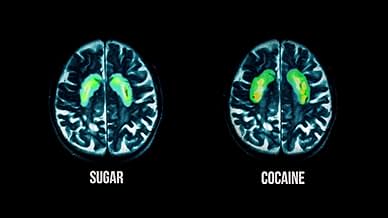An examination of America's obesity epidemic and the food industry's role in aggravating it.An examination of America's obesity epidemic and the food industry's role in aggravating it.An examination of America's obesity epidemic and the food industry's role in aggravating it.
- Director
- Writers
- Stars
- Awards
- 3 nominations total
Bill Clinton
- Self
- (as President Bill Clinton)
Michael Bloomberg
- Self
- (as Mayor Michael Bloomberg)
Mark Hyman
- Self
- (as Mark Hyman M.D.)
Tom Harkin
- Self
- (as Senator Tom Harkin)
- Director
- Writers
- All cast & crew
- Production, box office & more at IMDbPro
Featured reviews
If you pay attention to nutrition labels on the food products you buy, you may notice that next to the number of grams of sugar, there is no percentage shown. The sugar industry made sure of that. What they don't want consumers to know is that the sugar content of many of their products is 100% or more of the average daily requirement. Stephanie Soechtig excoriates the sugar industry for valuing profits over health in her hard-hitting documentary Fed Up. Produced by Katie Couric, who is also the narrator and Laurie David, producer of the climate-change documentary An Inconvenient Truth, the film compares awareness of the true causes of obesity to the decade's long campaign informing the public about the danger of smoking cigarettes.
Though individual choice does play a part, Fed Up says that the main problem is not the lack of will power of the individual but the fact that people have become addicted to sugar. According to Soechtig, collusion between the food industry, Congress and the U.S. Department of Agriculture has led to fierce opposition to regulation, government subsidies to farmers for their corn (which has been turned into high fructose corn syrup), unhealthy school lunch programs (80% have contracts with Coke or Pepsi), and relentless advertising campaigns directed towards children.
Bolstered by interviews with former President Bill Clinton, author Michael Pollan, and Senator Tom Harkin together with a bevy of medical researchers, the film cites statistics showing that 80% of the approximately 600,000 products sold in the supermarkets and convenience stores have added sugar and that, since the late 1970s, Americans have doubled their daily consumption of sugar so that now, one in every five people face obesity. It is estimated by the Environmental Working Group (EWG) that in one year, kids eat more than 10 pounds of sugar by weight from breakfast cereal.
Using charts and graphs, Soechtig also shows that the amount of sugar the industry has added to food to compensate for the unappealing taste of low-fat products has contributed to the increase in Type II diabetes such that by the year 2050, it is predicted that one out of three Americans will be diabetic. The film makes the problem even more real by focusing on several teenagers who have struggled with their weight for many years, emphatically pointing out the error of the conventional wisdom which says that eating less and exercising more (striking a balance between calories in and calories out), is the best solution.
Sparing no one including Michelle Obama, the film notes that her "Let's Move" campaign has been co-opted by the food industry and the responsibility for obesity placed on the individual. While Fed Up is definitely an advocacy doc and is typically one-sided (representatives of the food industry refused to be interviewed), it is an important film that doesn't try to "sugar coat" the problem but asks us to become involved by seeking an alternative to sugar-laden products, putting pressure on government and industry representatives, and demanding that the food industry begin caring about the health of our children. Now wouldn't that be sweet?
Though individual choice does play a part, Fed Up says that the main problem is not the lack of will power of the individual but the fact that people have become addicted to sugar. According to Soechtig, collusion between the food industry, Congress and the U.S. Department of Agriculture has led to fierce opposition to regulation, government subsidies to farmers for their corn (which has been turned into high fructose corn syrup), unhealthy school lunch programs (80% have contracts with Coke or Pepsi), and relentless advertising campaigns directed towards children.
Bolstered by interviews with former President Bill Clinton, author Michael Pollan, and Senator Tom Harkin together with a bevy of medical researchers, the film cites statistics showing that 80% of the approximately 600,000 products sold in the supermarkets and convenience stores have added sugar and that, since the late 1970s, Americans have doubled their daily consumption of sugar so that now, one in every five people face obesity. It is estimated by the Environmental Working Group (EWG) that in one year, kids eat more than 10 pounds of sugar by weight from breakfast cereal.
Using charts and graphs, Soechtig also shows that the amount of sugar the industry has added to food to compensate for the unappealing taste of low-fat products has contributed to the increase in Type II diabetes such that by the year 2050, it is predicted that one out of three Americans will be diabetic. The film makes the problem even more real by focusing on several teenagers who have struggled with their weight for many years, emphatically pointing out the error of the conventional wisdom which says that eating less and exercising more (striking a balance between calories in and calories out), is the best solution.
Sparing no one including Michelle Obama, the film notes that her "Let's Move" campaign has been co-opted by the food industry and the responsibility for obesity placed on the individual. While Fed Up is definitely an advocacy doc and is typically one-sided (representatives of the food industry refused to be interviewed), it is an important film that doesn't try to "sugar coat" the problem but asks us to become involved by seeking an alternative to sugar-laden products, putting pressure on government and industry representatives, and demanding that the food industry begin caring about the health of our children. Now wouldn't that be sweet?
Incredible documentary. Actually seeing people speaking the truth and exposing the food industry is so fulfilling. I applaud every one of those people who have a conscience and are more worried about protecting our children and future generations than filling their pockets with our new God, Money.
I laughed so hard at the part where they replaced the "Half the fat" label with "Double the sugar", it reminds me of super markets who make bigger shopping carts and brand them as "for your shopping convenience" rather than, "So you can buy more stuff and we can make more money."
My only regret with this movie is that I didn't see it 30 years ago. I've heard for years about how bad sugar is for you and not to drink pop and always shrugged it off. Sometimes you have to see a documentary like this for it to really sink in. I already know who I'm giving my last bag of sugar to.
A huge THANK YOU! to the creators of this movie from this parent.
I laughed so hard at the part where they replaced the "Half the fat" label with "Double the sugar", it reminds me of super markets who make bigger shopping carts and brand them as "for your shopping convenience" rather than, "So you can buy more stuff and we can make more money."
My only regret with this movie is that I didn't see it 30 years ago. I've heard for years about how bad sugar is for you and not to drink pop and always shrugged it off. Sometimes you have to see a documentary like this for it to really sink in. I already know who I'm giving my last bag of sugar to.
A huge THANK YOU! to the creators of this movie from this parent.
The film itself was disappointing in it's often unreadable graphics and sometimes ADD-like pacing of images but I give it a 10 for the important messages that need to find as wide an audience as possible. One of those messages is of the extreme amounts of added sugar in the average American diet but the other is about the tremendous conflict of interest in most government agencies, and our public servants in Congress, which have chosen to protect corporate profits over the health and safety of our citizens.
The more one learns about the causes of obesity and how to effect healthy weight loss the more one understands that most doctors and nutritionists are subject to the same misinformation and propaganda as the rest of us. It's not about exercise nor is it about calories. It's about the quality and the combination of the foods you consume.
I strongly recommend the books of Dr. Mark Hyman to anyone who wants to learn more. Especially "The 10 Day Detox Diet" which is a fast, uncomplicated read with very clear instructions. Diet, in this sense, is less of a weight loss scheme and more of a well explained, sensible plan on how to eat for the rest of your life to stay healthy. Weight loss is a byproduct of healthy eating. I recently followed his detox and lost 10 pounds by removing sugar and other inflammatories from my diet. I'm a very good cook, cook all my own food, and purchase nearly everything at the farmer's market. I thought I was already eating quite well. But I was ignorant on certain foods, such as beans and starchy vegetables, which rapidly turn to sugar once consumed. The body has a similar reaction to foods which turn into sugar quickly as it does to eating raw sugar directly. The point is that even if you think you have a healthy diet there are probably simple things you can do to make it even better.
Michael Pollan has offered some of the very best food advice that is too simple to ever forget. Eat real food, not too much, mostly plants. Don't eat anything your grandmother wouldn't recognize as food. Don't eat anything with more than 5 ingredients unless you made it yourself. I know that my grandmother wouldn't recognize most of what is sold in any supermarket in the country as actual food. What's on the shelves these days is more like futuristic food-like substances. Reminds me of how we used to giggle when Velveeta was marketed as an "authentic cheese food". That's about as far away from actual cheese, or real food, as one can get. And Kraft was being surprisingly honest about that.
As with most things nowadays, one has to learn to read the coded language of the marketing campaign as well as the not entirely truthful nutritional labels and ingredients list. Because while Big Food may be subject to some sort of wrist slap for outright lies they have officially sanctioned governmental approval to be as purposefully misleading as possible.
The more one learns about the causes of obesity and how to effect healthy weight loss the more one understands that most doctors and nutritionists are subject to the same misinformation and propaganda as the rest of us. It's not about exercise nor is it about calories. It's about the quality and the combination of the foods you consume.
I strongly recommend the books of Dr. Mark Hyman to anyone who wants to learn more. Especially "The 10 Day Detox Diet" which is a fast, uncomplicated read with very clear instructions. Diet, in this sense, is less of a weight loss scheme and more of a well explained, sensible plan on how to eat for the rest of your life to stay healthy. Weight loss is a byproduct of healthy eating. I recently followed his detox and lost 10 pounds by removing sugar and other inflammatories from my diet. I'm a very good cook, cook all my own food, and purchase nearly everything at the farmer's market. I thought I was already eating quite well. But I was ignorant on certain foods, such as beans and starchy vegetables, which rapidly turn to sugar once consumed. The body has a similar reaction to foods which turn into sugar quickly as it does to eating raw sugar directly. The point is that even if you think you have a healthy diet there are probably simple things you can do to make it even better.
Michael Pollan has offered some of the very best food advice that is too simple to ever forget. Eat real food, not too much, mostly plants. Don't eat anything your grandmother wouldn't recognize as food. Don't eat anything with more than 5 ingredients unless you made it yourself. I know that my grandmother wouldn't recognize most of what is sold in any supermarket in the country as actual food. What's on the shelves these days is more like futuristic food-like substances. Reminds me of how we used to giggle when Velveeta was marketed as an "authentic cheese food". That's about as far away from actual cheese, or real food, as one can get. And Kraft was being surprisingly honest about that.
As with most things nowadays, one has to learn to read the coded language of the marketing campaign as well as the not entirely truthful nutritional labels and ingredients list. Because while Big Food may be subject to some sort of wrist slap for outright lies they have officially sanctioned governmental approval to be as purposefully misleading as possible.
I've seen most of the movies that have been in theaters and online about nutrition. "Fed Up" is an important movie that does not have everything in it, but it tells the story in a good way and contains a wide variety of important information. I was very impressed.
One thread talks about how it is virtually impossible to overcome your body's instincts as well as habits you have been trained in since birth by commercials, and the ubiquity of food placement and messages that we get.
Another thread talks about the political system and how taken over it has been. When you start to piece things together - including facts from other industries - it becomes apparent that when we count GDP, Gross Domestic Product, we are really fooling ourselves counting the sale of foods that carry with them health costs that will show up for decades and be problems. The one thing we seem to be good at is manipulating people to hurt themselves in this country, and how can that have any good effect on either personal responsibility or the future of our way of life.
There is a lot to think about there. Several people have important messages including Dr. Robert Lustig, Gary Taubes, Michael Pollan, as well as others. I wish we got more than sound bytes and the movie was able to deeper into some of the issues here. The main idea that the movies takes on is that a calorie is not just a calorie, but it depends on the state of your body, and from where that calorie came from and what is it. Sadly this is not explained in depth, and I could have been.
An important movie that I am going to mention and urge people to go see.
NOTE - if you look through the reviews and comments in the message board you will see the typical empty vapid comments from people on the right-wing who will talk about personal responsibility. This is a good issue, and the movie deals well with it.
Go see this movie. 10/10
One thread talks about how it is virtually impossible to overcome your body's instincts as well as habits you have been trained in since birth by commercials, and the ubiquity of food placement and messages that we get.
Another thread talks about the political system and how taken over it has been. When you start to piece things together - including facts from other industries - it becomes apparent that when we count GDP, Gross Domestic Product, we are really fooling ourselves counting the sale of foods that carry with them health costs that will show up for decades and be problems. The one thing we seem to be good at is manipulating people to hurt themselves in this country, and how can that have any good effect on either personal responsibility or the future of our way of life.
There is a lot to think about there. Several people have important messages including Dr. Robert Lustig, Gary Taubes, Michael Pollan, as well as others. I wish we got more than sound bytes and the movie was able to deeper into some of the issues here. The main idea that the movies takes on is that a calorie is not just a calorie, but it depends on the state of your body, and from where that calorie came from and what is it. Sadly this is not explained in depth, and I could have been.
An important movie that I am going to mention and urge people to go see.
NOTE - if you look through the reviews and comments in the message board you will see the typical empty vapid comments from people on the right-wing who will talk about personal responsibility. This is a good issue, and the movie deals well with it.
Go see this movie. 10/10
Fed Up highlights sleazy lobbying efforts of the food industry and describes simple actions our government could take to alleviate the obesity epidemic. Even Michelle Obama was distracted by the industry. Perhaps with the prodding of this movie production, Michelle O. has more recently started to get back on track with making dietary changes in our schools.
Will our government move in the right direction? Only with a strong grass roots effort to counteract the industry. Fed Up gives us the tools. The People enacted change upon the tobacco industry. We can do it again for food!
Warning: Don't see this movie if you're happy with the status quo, a shorter, lower quality of life, and don't mind paying even more for health care.
Will our government move in the right direction? Only with a strong grass roots effort to counteract the industry. Fed Up gives us the tools. The People enacted change upon the tobacco industry. We can do it again for food!
Warning: Don't see this movie if you're happy with the status quo, a shorter, lower quality of life, and don't mind paying even more for health care.
Did you know
- TriviaAfter viewing this movie, writer/director/podcaster Kevin Smith cut the sugar from his diet and began rapidly losing weight.
- ConnectionsFeatures The Flintstones (1960)
- SoundtracksSugar Sugar
Performed by The Archies
Courtesy of Calendar, RCA Records
under license from Sony Music Entertainment
Written by Jeff Barry (BMI) and Andy Kim (BMI)
© Sony/ATV Songs LLC (BMI) Used by permission. All rights reserved.
Published by Steeplechase Music (BMI)
- How long is Fed Up?Powered by Alexa
Details
Box office
- Gross US & Canada
- $1,538,899
- Opening weekend US & Canada
- $126,028
- May 11, 2014
- Gross worldwide
- $1,546,229
- Runtime
- 1h 32m(92 min)
- Color
- Aspect ratio
- 1.78 : 1
Contribute to this page
Suggest an edit or add missing content































